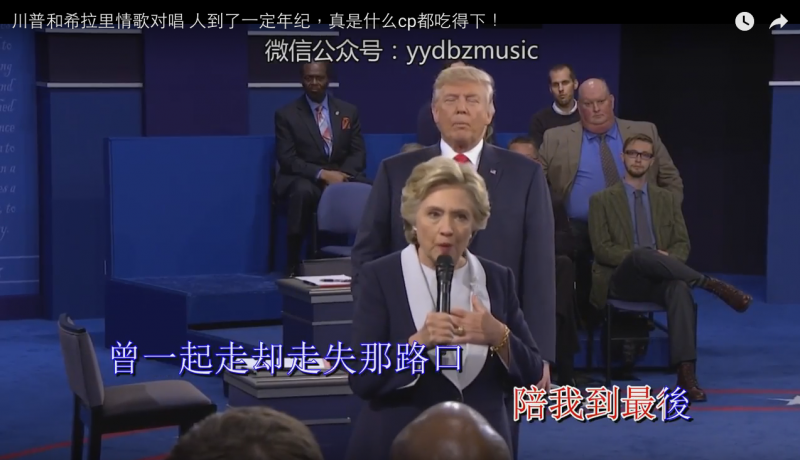Chinese netizens are chattering about a series of new spoof videos that features remixed footage from the October 9 US presidential debate. The videos depict Clinton and Trump as lovers, singing romantic songs to each other.
But these are not the average spoof videos made by a teenager with too much time on their hands. News outlets and social media accounts affiliated with the Chinese Communist Party and the government are jointly promoting the series of videos remixed by “netizens.” Since they can't stop people from following the news, propaganda authorities are doing their best to keep the focus on the more absurd aspects of the race between Hillary Clinton and Donald Trump.
The first debate which was live-streamed on various online platforms without Chinese subtitles has drawn huge Chinese netizens’ attention even though many of them could not fully understand the English debate. In popular Chinese social media site Sina Weibo, the live streaming has attracted more than 40,000 likes, 15,000 shares, and 13,000 comments, and the hashtag #USPresidentialDebateOnTV on Weibo had more than 7.38 million page visits.
The distribution of the second presidential debate was not as extensive as live-streaming platforms have stopped using the hashtag for the debate. When netizens search key terms such as “Trump,” “Hilary” or “U.S presidential debate,” the social media feed is flooded with contents about the spoof videos rather than serious discussions.
There are multiple versions of the videos featuring various well-known romantic love songs circulating on Chinese social media, and some have been uploaded to YouTube. Here is one:
The videos have been distributed by the Central School of the Chinese Communist Youth League (共青团中央学校部), state-owned TV network CCTV (央视网), the Communist Youth League affiliated media outlets China Youth Network (中国青年网) and Beijing Youth Weekly (北京青年周刊), and numerous CCP-controlled news outlets like the Chengdu Commercial Daily (成都商报) and Xiaoxiang Morning Herald (潇湘晨报).
The message attached to the music video by China Youth Network right after the debate read:
【毫无违和感!请欣赏川普和希拉里情歌对唱】今天美国总统大选第二场电视辩论结束,有才的网友将川普和希拉里的激辩现场做了一组情歌对唱图……现实中的美国大选比《纸牌屋》更离奇。作为“吃瓜群众”,不妨看看热闹罢了。
Totally inharmonious and at odds with the setting! Please listen to the love song sung by Trump and Hillary: Today the second US presidential debate has ended. Talented netizens have created a set of love songs…the reality of the US presidential debate is more bizarre than [the US drama series] “House of Cards.” For the “melon-eating masses,” why not join the crowd and take a look [at the love song].
The Chinese word for melon can also mean fool. “Melon-eating masses” refers to those people who enjoy being fools and don’t know the truth.
Influencing the online conversation
The video represents a tactical change for Chinese authorities. Regardless of the language barrier, thousands of Chinese netizens still watched the live-streaming of the first presidential election debate on September 26.
The associated online discussions included very mild criticisms of the Chinese political system, some in a mocking tone, such as:
民主国家就是烦,每天浪费时间在这些没用的事情上,还是钦定的好
Democratic countries are full of troubles, wasting so much time on meaningless issues, the system of appointment is much better.
领导人掐架不值得羡慕,羡慕的是后来未能当选的那个不会被弄死
We should not be envious of seeing leaders attacking each other, what we should be envious of is that after all the attacks, those defeated are still alive.
看人思己,一国首脑执政理念公之于众,接受别人的质询。
Looking at others and reflecting on ourselves. Leaders of the country presenting their visions to the public and responding to criticisms.
For the Chinese Communist Party, the US presidential election is a showcase of the failure of the western democratic system, and the endless stream of scandals surrounding both main candidates is proof that the US has no right to lecture others on tenets of democracy.
However, there's no room for debate about the system back home — even mere deliberation on the merits of the Chinese model of governance can trigger opinions that go against the official line. The recent shutting down of “Gongshi” or Consensus (21ccom.net) reflects the authorities’ anxiety in public deliberation.
While many of the comments to the videos were laughing emoticons, the fact that people are being treated like “melon-eating masses” is not funny at all.









3 comments
Propaganda just like this piece.
https://uploads.disquscdn.com/images/8273df24f8b3e580f14ad9481615256b5cef372e462be2dfa70b3cd3fe326f1b.jpg